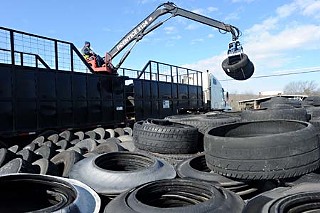Naked City
News briefs from Austin, the region, and beyond
Fri., Feb. 12, 2010

Taxi Ride to Nowhere
"We are free to drive any 15 hours a day we choose." That's a telling remark by an Austin taxi driver in a new report on local working conditions. Among the grim findings: The average driver income, including tips, is $200 a week (before taxes), without benefits or insurance – and that's if he rides roughly 12-hour days, 6½ days a week, and takes unpaid "vacations" of perhaps half a week a year. A job once seen as that of an urban cowboy, enjoying freedom and independence, has instead become one of endless drudgery and danger for barely survivable wages. The report, "Driving Austin, Driving Injustice," was issued this week by Legal Assistance to Micro-Enterprises Project, a project of Texas RioGrande Legal Aid and Texas C-BAR, funded in part by the Department of Housing and Urban Development and with the cooperation of the Taxi Driver Association of Austin, a newly formed driver advocacy group. The report includes recommendations to the city on reforming the local taxi industry; it can be downloaded at www.austintaxidriver.org. – Michael King
Hall Behind Bars
Laura Ashley Hall will face a new sentencing trial March 8 for her role in the 2005 murder and partial dismemberment of UT student Jennifer Cave. Witnesses said Hall was dragged from the courtroom protesting her imprisonment. Judge Wilford Flowers ruled that because the appeals court granted Hall a new sentencing hearing but upheld her underlying convictions for tampering with evidence and hindering apprehension, she was no longer entitled to remain out of jail on bond pending her upcoming hearing. Before leaving the room, Hall told a mute Flowers that she was not guilty and should be sent home. Hall was convicted in 2007 of attempting to cover up Cave's death and helping her friend, former UT student Colton Pitonyak – who had shot and killed Cave while on a drug- and alcohol-induced bender – to flee to Mexico. Pitonyak was convicted in 2007 and sentenced to 55 years in prison. Hall was sentenced to five years, but that sentence was tossed out after the 3rd Court of Appeals concluded that prosecutors had failed to disclose to her defense key information regarding its sole witness during the punishment phase of her trial. Heading back to a jury for sentencing next month is something of a gamble for Hall, exposing her to the entire range of punishment available for her offenses, including up to 10 years in prison. Had she chosen a bench trial, Flowers would have been restricted to a maximum punishment of the five years her previous jury had imposed. – Jordan Smith
Carstarphen's Controversy
Austin ISD board work sessions aren't usually sources of contention. Yet the Feb. 8 trustees' meeting furrowed some brows as Superintendent Meria Carstarphen continued to make her case for declaring financial exigency by presenting predictions of an 8-10% drop in the commercial property tax base. This comes less than a week after Carstarphen launched her Turnaround Initiative to bring more private and nonprofit entities into schools. Several board members have publicly and repeatedly expressed major concerns about restructuring the district without a clearer view of the budget. The exigency plan is currently scheduled to come before the board for a vote on Feb. 22. – Richard Whittaker
In Search of Austin's New Green Chief
Austinites helped shape the hiring criteria for the city's chief sustainability officer at a Feb. 5 public meeting. Scott Reilly, CEO of executive-search firm Affion Public, told attendees that because the CSO will be directly reporting to the city manager, the position can have a substantive impact on all municipal operations and the community as a whole. The CSO (an increasingly popular position with cities and corporations) will oversee all issues related to the city's consumption of resources, its environmental impact, and its carbon footprint – from purchasing to recycling, energy conservation to vehicle miles traveled. The meeting drew business and high tech representatives as well as environmental activists. Among the points made: With "sustainability" as council's overarching theme for the comprehensive plan in progress, this hire needs to be made ASAP. Reilly anticipates interviews in April and a decision in May, and that the CSO will eventually oversee a department or decentralized staff based in key city departments; he also said Austin Climate Protection Program Director Ester Matthews will retire this year (which presumably favors a merger of sustainability and climate efforts). A job description reflecting the community input will be posted on the city's eCareer website in about a week; the human resources contact is [email protected]. – K.G.
The MRF Turns: Free Recycling!
The question of whether Greenstar North America and Texas Disposal Systems violated the city's lobbying ordinance took a strange turn recently as TDS made what could be an end run around the city's bidding process. On Jan. 27, both firms were disqualified from bidding on the contract to build a materials recovery facility to handle Austin's single-stream recycling (the firms had sent letters to city staff, actions the city determined to be in violation of anti-lobbying rules; see "Muffing the MRF," Feb. 5). On Feb. 5, Greenstar's representatives attended a meeting with a hearing officer, who now has until Feb. 15 to recommend to city purchasing officer Byron Johnson whether the company's bid should remain excluded. Meanwhile, the city ruled TDS' disqualification moot after the company told city staff that it had never intended to file an application in the first place. Gregory wrote in a Feb. 9 letter to council that "it became abundantly clear during the protest process" that, if his firm submitted a bid, it could not communicate with the city about any recycling issues. So instead of bidding on the current contract, Gregory proposed council amend TDS' existing 30-year waste disposal and yard trimmings processing contract – to include a MRF. Not that Austin is lacking for potential contractees: At the close of bidding on Feb. 9, seven firms had submitted a total of eight proposals that could have a city MRF open as early as August 2011. – R.W.
Got something to say on the subject? Send a letter to the editor.






